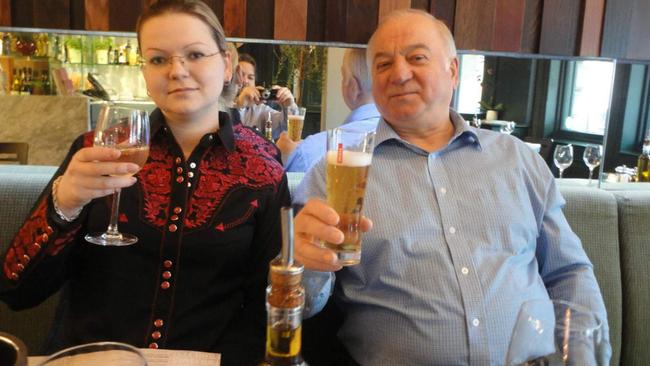Russian spy Skripal attack highlights blurring of lines between the state and freelancers
Blurred lines between the Russian state and its proxies mean a Putin role in ordering the Skripal hit could be the lesser of two evils.

When Sergei Skripal left Russia in 2010, his fate seemed to have taken a bright turn. As part of a prisoner exchange with Britain and the US, the MI6 double agent swapped a Russian jail cell for suburban life in Wiltshire.
Having been pardoned in Moscow and debriefed in London, he appeared destined for a quiet retirement. But on March 5 he and his daughter, Yulia, were found unconscious on a park bench in Salisbury, in southwest England.
They remain in a critical condition, the victims of what police identified as a nerve agent.
A police officer among the first to attend the scene also was hospitalised.
Though the investigation is in its infancy, suspicion has fallen on Russia. The case has drawn comparisons to the murder of Alexander Litvinenko in London in 2006.
Litvinenko, a Russian spy turned critic of Vladimir Putin, died after drinking tea laced with polonium-210, a radioactive substance. An official inquiry later found that his murder had “probably” been approved by Mr Putin.
On March 6, British Foreign Secretary Boris Johnson called Russia a “malign and disruptive force”. Russia has denied involvement in the Skripals’ poisoning, accusing Britain of leading an anti-Russian campaign.
Investigating the crime, and calibrating a response, will be made more difficult by the blurred distinction between acts carried out by the Russian state and those carried out by people acting in its name. Since the Litvinenko killing, Russia’s aggressions — against domestic opponents, adversaries in Ukraine and in Syria, or Western democracies online — increasingly have relied on freelancers interpreting impunity as an instruction.
The murder in 2015 of Boris Nemtsov, a Russian opposition leader, was carried out by Chechen assassins, probably acting in the service of Ramzan Kadyrov, the Chechen strongman. The invasion of eastern Ukraine was led by a former Russian intelligence officer (and aficionado of historical battlefield re-enactments), who gathered an informal army. The operation was at least partly financed by a Russian billionaire who had been facing embezzlement charges in Moscow.
Some of the men who fought in Ukraine resurfaced in Syria, in a mercenary force known as the Wagner group, which recently clashed with US troops. The group is believed to be financed by Yevgeny Prigozhin, a catering baron known as “Putin’s chef”. He also has been indicted in the US for running a troll farm that meddled in the 2016 election.
The fog around who is responsible for such attacks allows Putin to deny the Russian state’s involvement while benefiting from the fear they sow. When soldiers with no markings — the so-called polite men — turned up in Crimea, Putin initially denied they were Russian troops. The double-dealing was summed up by Defence Minister Sergei Shoigu, who said: “It is hard to search for a black cat in a dark room, particularly if it is not there. Especially if this cat is smart, brave and polite.”
The reappearance of the black cat on British soil has prompted tough talk from politicians. Some are keen to compensate for the feeble response to the Litvinenko murder. Despite the use of radioactive material to assassinate Litvinenko in central London, Britain did not recall its ambassador to Moscow. Prime Minister Theresa May was home secretary at the time. She resisted pressure for an official inquiry into Litvinenko’s death, offering six reasons for delaying, including public expense and the risk to business.
Russia may have inferred from that episode that it had little to lose by unleashing violence. “There’s a perception at the moment in Russia that Britain is unlikely to bring about sanctions that hurt — sanctions on money and oligarchs and their families — because Britain needs the money and will need it even more post-Brexit,” says Mark Galeotti of the Institute of International Relations Prague, a research outfit.
Perhaps trying to shake off this perception, May gave a fiery speech late last year accusing Putin of “weaponising information” to sow discord in the West. Influential MPs are pushing for Russian diplomats to be expelled, oligarchs’ Mayfair mansions to be seized and their children barred from British schools.
Some of this is easier said than done. Britain has already gone further than most countries in trying to force transparency on shell companies and property. In 2016 it was the first country to set up a public register of companies’ beneficial owners, and it has plans to do the same for foreign owners of property. Unexplained Wealth Orders, which came into force in January, require rich people to explain the source of their assets.
Last year the British parliament passed a diluted version of the US’s Magnitsky Act, which lets police seize the assets of human rights abusers. The measures are aimed primarily at Russia. Yet Putin’s cronies are experts at covering their tracks, using proxies to stay several steps removed from their assets.
And a crackdown on rich, crooked Russians in London would hit as many of Putin’s enemies as friends.
Like most countries in the West, where the licence to exert force tends to be centralised and the security services are accountable to public scrutiny, Britain still sees Russia as a state adversary, not as an informal network of people with access to lethal substances and weapons. The blurring of lines between Russia’s government, security apparatus, business and criminal worlds makes it a more complex and dangerous opponent. It is worrying that Putin may have ordered another murder on British soil. The bigger worry is that he did not.



To join the conversation, please log in. Don't have an account? Register
Join the conversation, you are commenting as Logout